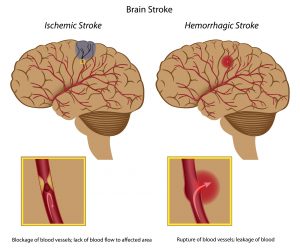A non-traumatic brain injury is caused by a wide range of insults. These injuries can be focal (e.g. stroke) or diffuse and widespread. Causes of non-traumatic brain injury include vascular, anoxic, metabolic, infective and autoimmune (see below).
Stroke
Stroke (also known as cerebrovascular accident) is a vascular cause of brain injury.  There are two types of stroke, ischaemic and haemorrhagic. Approximately 85% of strokes are due to a blockage of blood supply to part(s) of the brain. Common causes of blockage can include narrowing of the arteries (atherosclerosis) or a blood clot blocking a vessel (embolism). This is described as an ischaemic stroke or cerebral infarct. This causes a restriction in blood supply which in turn causes a reduction in oxygen supply and other important nutrients required to keep brain tissue alive. The other 15% of strokes are caused by bleeding into the brain i.e. haemorrhagic stroke or intracerebral haemorrhage. Further brain injury can be caused by secondary complications of haemorrhage i.e. cerebral oedema, raised intracranial pressure and reduction in oxygen supply (anoxia).
There are two types of stroke, ischaemic and haemorrhagic. Approximately 85% of strokes are due to a blockage of blood supply to part(s) of the brain. Common causes of blockage can include narrowing of the arteries (atherosclerosis) or a blood clot blocking a vessel (embolism). This is described as an ischaemic stroke or cerebral infarct. This causes a restriction in blood supply which in turn causes a reduction in oxygen supply and other important nutrients required to keep brain tissue alive. The other 15% of strokes are caused by bleeding into the brain i.e. haemorrhagic stroke or intracerebral haemorrhage. Further brain injury can be caused by secondary complications of haemorrhage i.e. cerebral oedema, raised intracranial pressure and reduction in oxygen supply (anoxia).
Detailed information specific to Stroke is available from the Stroke Training and Awareness Resources (STARS).
Haemorrhagic Brain Injury
Haemorrhagic brain injury refers to bleeding within the cranial cavity and is another vascular cause of brain injury. When this occurs spontaneously it presents as a stroke. Intracerebral haemorrhage also occurs in association with traumatic brain injury.
Vascular haemorrhages include:
- Intracerebral haemorrhage: bleeding into brain substance as a result of rupture of a weakened blood vessel, a cerebral aneurysm (abnormal swelling of a blood vessel) or an arteriovenous malformation (abnormal connection between arteries and veins).
- Subarachnoid haemorrhage: bleeding between arachnoid & pia maters which results in blood mixing with the cerebrospinal fluid (CSF). This can occur spontaneously from a ruptured cerebral aneurysm or arteriovenous malformation.
Anoxic Brain Injury
Although the brain accounts for only 2% of the total body weight it consumes 20% of the body’s oxygen supply. The brain is extremely sensitive to any reduction in oxygen supply and neurons begin to die within minutes of oxygen restriction. Anoxia refers to oxygen starvation. Causes of anoxic brain injury include:
- Cardiac arrest (e.g. following heart attack).
- Respiratory arrest (e.g. following drug overdose).
- Suffocation (e.g. during a fire).
- Strangulation or self-hanging suicide attempt.
- Near drowning.
- Lightning strike.
- As a secondary complication of TBI and toxic/metabolic brain injury
- As a secondary complication of stroke.
Metabolic/Toxic Causes of Brain Injury
The brain is also vulnerable to a reduction in glucose. A severe reduction in glucose (hypoglycaemia) can result in widespread brain damage. Other disturbances in the body’s metabolism (e.g. renal failure, liver failure) can result in brain damage following a build up of toxins in the blood supply to the brain. In addition, exposure to toxins (e.g. carbon monoxide, cyanide) may interfere with the oxygen supply to the brain or the toxins may damage the brain directly.
Infection Causing Brain Injury
The brain is generally very well protected from infection but viruses, bacteria and other organisms may breach these defences resulting in direct damage to the brain itself or to the meninges. Brain infections include:
- Encephalitis: infection/inflammation of the brain usually due to a virus.
- Meningitis: infection affecting the meninges caused by viruses, bacteria or other organisms. Viral meningitis is often self-limiting although it may be associated with viral encephalitis. Bacterial meningitis is often life-threatening.
Autoimmune Causes of Brain Injury
Brain injury can also be caused by an autoimmune reaction to specific receptor sites at the synaptic junction. If the cause of the brain injury is not immediately obvious or an unexplained deterioration occurs following a recent brain injury then investigations for an autoimmune cause should be instigated. Examples include NMDA receptor antibodies, anti-GABA antibodies and voltage gated potassium channel antibodies. Specialist advice is required.